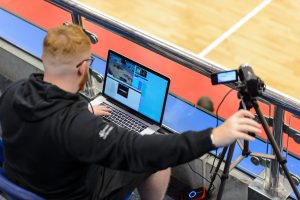Paris 2024: Maximising Performance Analysis at the Paralympic Games
Performance Analysis has been embedded in elite sport for decades, but constant strides are being made in the methods of capturing and sharing data, meaning those who work in the discipline need to stay on top of their game. The UK Sports Institute (UKSI) has been delivering Performance Analysis support to Olympic and Paralympic sports since its inception in 2002, and the Paris Paralympic Games has presented a new opportunity.

Julia Wells, Head of Performance Analysis at the UKSI, explained: “Over the past few cycles, we’ve had a number of engagements with ParalympicsGB, and we could all see an opportunity and wanted to raise the bar on this.”
Julia, who has been with the UKSI for over two decades, leads Performance Analysis for Team GB at the Olympic Games and was keen to share this experience with colleagues at ParalympicsGB.
Julia continued: “We came together to have a chat and explore, there were no commitments, just taking a look at what’s been done, what the practitioners were saying within the sports and how we could learn from some of the stuff we’ve done on the Olympic side.”
Following a number of conversations with Jonny Riall, Head of Performance at ParalympicsGB and Nik Diaper, Head of Paralympic Performance Support at the UKSI, it was agreed that expanding the Performance Analysis offer to Paralympic sports could offer a genuine performance gain.
The UKSI’s Emma Bird was appointed in late 2023, with support from Anna Knowles. Day-to-day, Emma works full-time with the UKSI as a Performance Analyst within Para Table Tennis and GB Climbing, and has been undertaking the Paris-focused role with ParalympicsGB since the start of the year.
She explained how the role and its responsibilities has been taking shape: “Initially we did a period of scoping with the sports, understanding what their needs were through surveys, working with the practitioners, lots of different calls with coaches and team leaders to understand what their needs are and what we could put in place.
“Julia’s got a really well-established team on the Olympic side, and we’ve learnt a lot from how they’ve set up their capture service and their Performance Analysis provision. But we were also conscious not to just go with that as a first option – we wanted to really make it impactful and relevant for the sports.”
From there, Emma made recommendations to ParalympicsGB and analysts were appointed to work out of the BPA’s London HQ during the Games, creating a hub that will be working across a multitude of sports. One of the main functions of the team will be to capture broadcast video and get it back out to sports as quickly as possible, with 11 of the 19 Paralympic sports signed up to be part of this service.
Emma continued: “It’s probably a lot more than maybe we initially thought, but for a first-time service, I think it’s really positive to have that kind of buy in.”
In addition, there will be a number of Performance Analysis practitioners out in Paris, directly supporting sports, and a number of others back in the UK, either working out of the ParalympicsGB hub, or from home bases.
Emma explained that the set-up is a combination designed to best support the sports and athletes on the ground in Paris: “Sometimes it’s the coaches who will video and that will be their process of doing things, but obviously we are factoring in that the Games are really busy and we want to take that workload off a coach.
“Also, there are some sports with analysts, but the sport might be across multiple tables or courts, like in Para Table Tennis or Boccia, which is quite a lot to manage, so any extra support we can provide will be really useful.
“The other thing that we’ve worked hard on is being that single point of contact with trying to disseminate, inform or get as much information as possible from the organising committee and the broadcasters.
“Analysts really want as much information as possible and the Games has a lot more moving parts than normal championships, so we’ve worked hard to gather that all into a central place and work with the sports, their team leaders or HoPS [Head of Performance Support] to disseminate that.”
A strong relationship with the Paralympic host broadcaster in the UK, Channel 4, has also been crucial to Emma and her team’s planning.
“Channel 4 will be broadcasting extensively during the Games, so they are going to put everything onto their YouTube channels, so any feed of any sport will be available. They’ll have individual feeds for each sport, which is unprecedented access and a real game changer for us analysts,” she said.
For Emma, success will be helping the sports to feel as prepared as possible heading into, and during, the Games:
“It’s all about trying to be as impactful as possible in various different areas. It might be that we’ve managed to get footage of the next round opponents to a coach as they’re getting on the bus back to the Village, or saving an analyst a few hours of time late at night by getting them some video.”
Julia concurs and reinforced that the impact that Emma references could be truly game changing:
“The biggest thing is providing the analysts or the coaches on the ground with the right information, at the right time and allowing them to be best prepared. That could be the difference between someone making a final, or getting onto that podium, because we’ve been able to get them some video that has supported that process.”
Nik Diaper, Head of Paralympic Performance Support at the UKSI, concluded: “We have a long history of partnership working between UKSI and ParalympicsGB and this is another great example of how that partnership works to add value to athletes and coaches on the ground”.
Support ParalympicsGB during the Paralympics Games, from 28 August – 10 September.